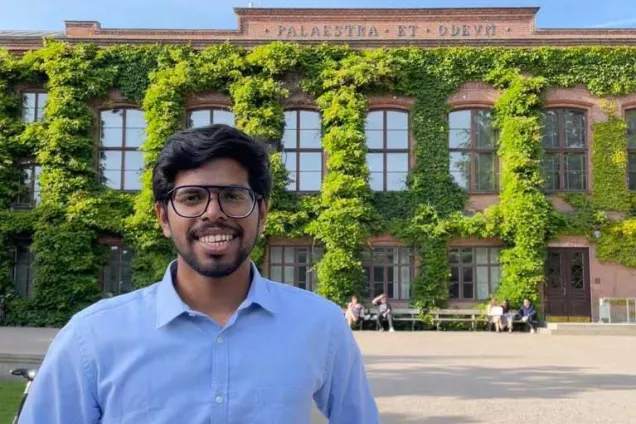Molecular Biology, Molecular Genetics and Biotechnology - Master Programme
Master's programme · 2 years · 120 credits

Description
Basic research in molecular genetics has generated entirely new opportunities to diagnose diseases. There is a great deal of potential to convert research findings into industrial applications. The Master’s programme provides a good foundation for third cycle studies within the field, while also preparing you for professions in industry through course components focusing on innovation, entrepreneurship and commercialisation.
Technical achievements have made it possible to relatively quickly read the entire genetic make-up of organisms – the genome. Academia and industry are now faced with the challenge of interpreting all this information and ascertaining the various functions of the genes. Our Master’s programme enables you to take part in this development.
Molecular genetics integrates biology with chemistry, physics and technology. As a Master’s student you will obtain specialised knowledge in gene technology, cell biology, molecular biology and biotechnology. There is also a great deal of focus on components that prepare you for professions in the pharmaceutical, biotechnology and food industries in areas such as patents, innovation, legislation related to molecular biotechnology and start-up of biotechnical companies. The programme also provides extensive experimental experience and valuable knowledge in experimental design and analysing results. You will practice both oral and written presentations and obtain ample experience in working in groups.
Teaching takes place on modern premises and in laboratories with advanced equipment. The Master’s programme has a high proportion of face-to-face teaching, including group studies and laboratory work. The programme is conducted in an international environment and has strong ties with research. All of the teaching staff are researchers, and as a result the teaching is continuously adapted based on current research. The Department of Biology has several world-leading research teams and conducts both basic research and applied research. The language of instruction is English.
Programme structure
In the first semester you start wit a compulsory course on molecular genetics of eukaryotes plus one elective course on immunology or molecular microbiology. In the spring semester you will take two compulsory courses – one on molecular biotechnology and one on genetic analysis – as well as an elective course, i.e. bioinformatics.
If you would like to immerse yourself in bioinformatics, you can take courses on sequence analysis and programming in Python in the third semester. You can also take certain biomedicine courses. The degree project is worth 30, 45 or 60 credits and is conducted in a research team at either the Faculty of Science or the Faculty of Medicine, or at a pharmaceutical or biotechnical company, for example. If you decide to do a degree project worth less than the maximum number of credits, you can do a second project. You can also do an internship, which can provide valuable professional contacts during the programme.
Career prospects
After graduation you will be well-equipped for third cycle studies in both Sweden and abroad. The labour market in business and industry is also growing. Both large and small companies are investing in genetic analysis and development of new drugs as a result of new research findings in molecular genetics. Technical applications are found in the pharmaceutical, biotechnology and food industries, where molecular biology also contributes to the development of environmentally friendly products and helps create a sustainable society.
Computers in the programme
The programme requires that you have access to a computer, preferably a laptop, on which you can install software mainly provided by the University, such as Microsoft 365, CAD/CAM and development environments for Python, Matlab or other computational tools. It can be either a Windows computer or a MacOS. On some courses you may need to buy or rent your own software.
Conditions in the study environment and during study visits and field studies
The programme contains compulsory elements that require you to be able to work independently and safely in a laboratory environment, in a hospital environment, in workshops, in production facilities, or during study visits and field studies. These elements require the ability to comply with safety regulations and instructions, and to move around in and evacuate premises safely. The elements also require the ability to monitor and control the processes studied.
Ethical concerns
The programme includes compulsory elements that some people may have concerns about, such as patient-centred activities in healthcare, animal testing or dissection. However, the student is obliged to acquire knowledge and skills in these areas as well, to the extent necessary to fulfil the learning outcomes of the course. For some elements, there might be specific requirements regarding rules on hygiene, the design of protective and work clothing, confidentiality and professionalism.
Closed for applications
Application opportunitiesClosed for applications
Learn more about our application periods and when to apply for studies at Lund University.
Contact
Study adviser
Christina Ledje
Phone: +46 46-2227316
Email: molbiol_master [at] biol [dot] lu [dot] se
Requirements and selection
Entry requirements
Specialisation: Molecular Genetics and Biotechnology
Bachelor’s degree of at least 180 credits or the equivalent, of which 120 credits must be in science/biomedicine/engineering, including:
45 credits in molecular biology comprising genetics, cell biology and microbiology
30 credits in chemistry comprising biochemistry
Proficiency in English equivalent to English 6/B from Swedish upper-secondary school.
Selection criteria
English language requirements
Most of Lund University’s programmes require English Level 6 (unless otherwise stated under 'Entry requirements'). This is the equivalent of an overall IELTS score of 6.5 or a TOEFL score of 90. There are several ways to prove your English language proficiency – check which proof is accepted at the University Admissions in Sweden website. All students must prove they meet English language requirements by the document deadline, in order to be considered for admission.
How to prove your English proficiency – universityadmissions.se
Country-specific requirements
Check if there are any country-specific eligibility rules for you to study Bachelor's or Master's studies in Sweden:
Country-specific requirements for Bachelor's studies – universityadmissions.se
Country-specific requirements for Master's studies – universityadmissions.se
Apply
Start Autumn Semester 2025
Day-time Lund, full time 100%
In English
Study period
1 September 2025 - 6 June 2027
Application
Closed for applications
How to apply
Lund University uses a national application system run by University Admissions in Sweden. It is only possible to apply during the application periods.
Step 1: Apply online
- Check that you meet the entry requirements of the programme or course you are interested in (refer to the section above on this webpage).
- Start your application – go to the University Admissions in Sweden website where you create an account and select programmes/courses during the application period.
Visit the University Admissions in Sweden website - Rank your programme/course choices in order of preference and submit them before the application deadline.
Step 2: Submit documents
- Read about how to document your eligibility and how to submit your documents at the University Admissions in Sweden website. Follow any country-specific document rules for Master's studies or Bachelor's studies
Country-specific requirements for Bachelor's studies – universityadmissions.se
Country-specific requirements for Master's studies – universityadmissions.se
- Get all your documents ready:
- official transcripts and high school diploma (Bachelor's applicants)
- official transcripts and degree certificate or proof that you are in the final year of your Bachelor's (Master's applicants)
- passport/ID (all applicants) and
- proof of English proficiency (all applicants).
- Prepare programme-specific documents if stated in the next paragraph on this webpage.
- Upload or send all required documents to University Admissions before the document deadline.
- Pay the application fee (if applicable – refer to the section below on this webpage) before the document deadline.
* Note that the process is different if you are applying as an exchange student or as a part of a cooperation programme (such as Erasmus+).
* If you have studied your entire Bachelor's programme in Sweden and all of your academic credits are in Ladok, you do not have to submit transcripts or your diploma when applying for a Master's programme. However, there may still be other documents you need to submit! See the link below.
* Svensk student?
Läs instruktionerna om att söka till ett internationellt masterprogram på lu.se
Programme-specific documents
In addition to the documents mentioned under Step 2, you must also submit a 'Summary Sheet' when you apply to this programme.
Summary Sheet for the Master's programmes in Molecular Biology (PDF, 106 kB, new tab)
Tuition fees
Non-EU/EEA citizens
Full programme/course tuition fee: SEK 340 000
First payment: SEK 85 000
Citizens of a country outside of the European Union (EU), the European Economic Area (EEA) and Switzerland are required to pay tuition fees. You pay one instalment of the tuition fee in advance of each semester.
Tuition fees, payments and exemptions
EU/EEA citizens and Switzerland
There are no tuition fees for citizens of the European Union (EU), the European Economic Area (EEA) and Switzerland.
Application fee
If you are required to pay tuition fees, you are generally also required to pay an application fee of SEK 900 when you apply at the University Admissions in Sweden website. You pay one application fee regardless of how many programmes or courses you apply to.
- Paying your application fee – universityadmissions.se
- Exemptions from paying the application fee – universityadmissions.se
- Convert currency – xe.com
*Note that there are no tuition or application fees for exchange students or doctoral/PhD students, regardless of their nationality.
Scholarships & funding
Lund University Global Scholarship programme
The Lund University Global Scholarship programme is a merit-based and selective scholarship targeted at top academic students from countries outside the EU/EEA.
Lund University Global Scholarship
Within the framework of the Lund University Global Scholarship programme, the University also offers the African Research Universities Alliance (ARUA) Scholarship targeted at top academic students from selected African research universities.
Swedish Institute Scholarships
The Swedish Institute offers scholarships to international students applying for studies in Sweden at Master's level.
Scholarship information on the Swedish Institute website
Country-specific scholarships and funding options
Lund University has agreements with scholarship organisations and funding bodies in different countries, which may allow applicants to apply for funding or scholarships in their home countries for their studies at Lund University.
External scholarships
Testimonials about this Master's

Meet our student ambassador
Read Marija's testimonial and chat with her via Unibuddy.

Meet our student ambassador
Read Oussama's testimonial and chat with him via Unibuddy.

"The professors are amazing scientists in their fields"
Rohit from India

"Gives you theoretical as well as practical knowledge"
Melina from Greece